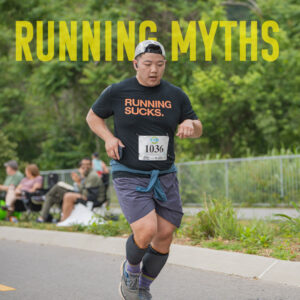Running Myth Busters: 7 Lies We’re Leaving in the Dust
 Let’s be real—running has a bit of a reputation. For some, it’s the joyful heartbeat of their day; for others, it’s a terrifying thought that conjures up the response “I only run if someone’s chasing me.” And somewhere in between. A whole bunch of well-meaning myths that can scare folks away from giving running a real chance.
Let’s be real—running has a bit of a reputation. For some, it’s the joyful heartbeat of their day; for others, it’s a terrifying thought that conjures up the response “I only run if someone’s chasing me.” And somewhere in between. A whole bunch of well-meaning myths that can scare folks away from giving running a real chance.
We hear these myths all the time: "Running ruins your knees!" or "You're too old to start now!" Sound familiar? Well, we’re here to crush those outdated ideas like a well-worn pair of running shoes on a gravel trail. Whether you’re brand new to the sport or you’ve been running for years, these are 7 of the most common running myths—busted with real advice, research, and maybe a little tough love. Let’s go!
Myth #1: Running will wreck your knees
This one gets thrown around a lot, and while it’s not completely baseless, it’s definitely not the whole story. It’s true—some runners experience knee pain, especially if they ramp up mileage too fast, skip recovery days, or wear worn-out shoes. But according to The Guardian, studies show that recreational running actually isn’t linked to higher rates of knee osteoarthritis and may even have protective benefits for joint health when done correctly.
What really matters? Proper form, strength training, and a smart training plan. Oh, and listening to your body. If your knees are talking, don’t ignore them—see a professional and adjust your routine. Running itself isn’t the enemy—it’s how we approach it.
Myth #2: You have to stretch a ton before every run
Stretching is good, right? Sure—but not all stretching is created equal. The team at Outside Run says static stretching (like holding a toe touch for 30 seconds) before a run isn’t very effective and could even mess with your performance. Instead, they recommend dynamic warmups—think leg swings, walking lunges, or high knees—to get your muscles ready to move.
Myth #3: Running is an expensive hobby
Let’s be honest—every hobby can be expensive if you let it. But to start running? You don’t need $200 shoes, a fancy watch, or ultra-lightweight gear. EW Motion Therapy says that for beginners, a comfortable pair of shoes and clothes you already own are plenty to get started. Save the big purchases for later—or make them rewards for consistent running—if and when you want them.
Myth #4: Running is only for young, super-fit people
Nope! Running is for all ages, all sizes, and all fitness levels. You don’t need to be fast or fit to call yourself a runner. People start running in their 40s, 50s, 60s and beyond—and many of them find their groove and thrive. Everyone starts somewhere, and there’s no age limit on movement.
Myth #5: Walking during a run means you’re failing
Let’s squash this one once and for all. Taking walk breaks doesn’t mean you’re not a “real” runner. In fact, Outside Run explains that many successful runners use strategic walk/run intervals to build endurance, prevent injury, and actually improve their race times. Whether you're following a specific strategy or just listening to your body, walking is part of the process—not a step backward.
Myth #6: You don’t need strength training if you run
Running alone isn’t enough to keep your body in balance. Strength training is crucial for runners—especially to help prevent injury, build power, and support all those stabilizer muscles that running alone can’t hit. Think squats, lunges, and core work. Bonus: you don’t need a gym to make it happen.
Myth #7: You need to carb-load the night before every race
We’ve all heard the “eat a giant plate of pasta” advice the night before a big race. But Woodlands Sports Medicine says overdoing it with carbs can actually leave you feeling bloated and sluggish on race day. What’s more important? Eating a balanced diet consistently in the days leading up to your event—not just loading up the night before.
So, what’s the takeaway?
Running isn’t reserved for a specific kind of person—and it doesn’t require perfect knees, fancy gear, or flawless form. If you’ve been holding back because of something you “heard” about running, now’s the time to let that go. The running community is open, welcoming, and full of people just like you—learning, improving, and having a blast out on the roads and trails.

